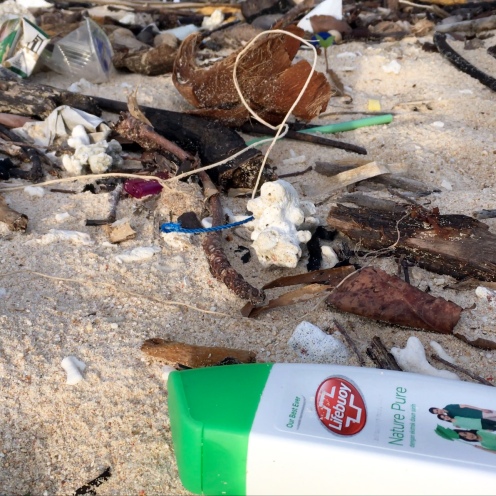Marine Life & Conservation
Pierre-Yves Cousteau’s Raja Ampat
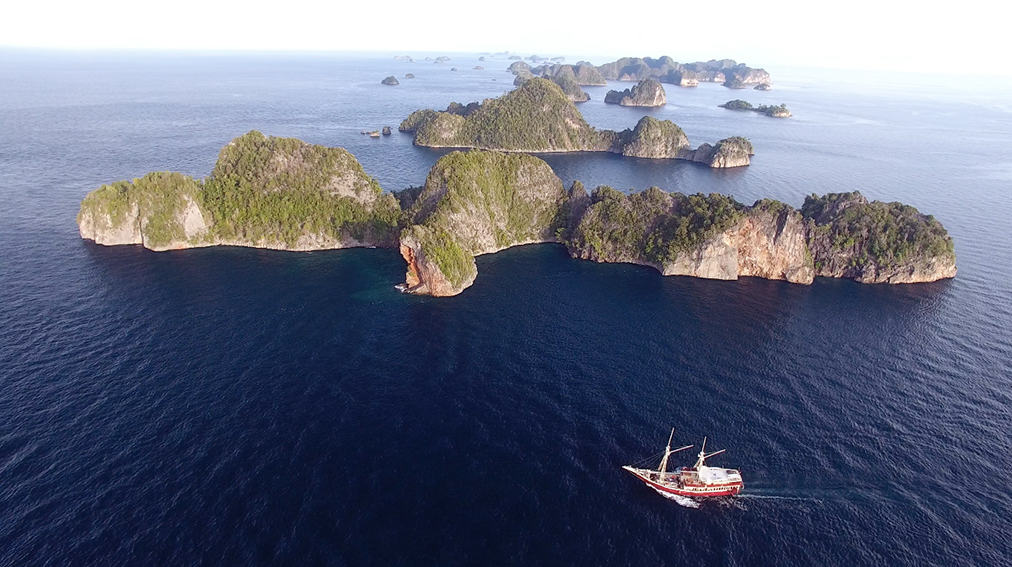
Our planet still has exceptional wildlife. But one must travel far to witness some of the last remaining unspoiled areas. Arriving in Sorong brought back old memories of my last visit and it felt so right.
After our very first day of diving, before setting sail south to Misool, we visited a small beautiful island. A perfect postcard jewel. Setting foot on its long lazy beach towards the end of the afternoon, just as the last jet ski buzzed back to the awful mother ship that spawned it, we found a lonesome man collecting the day’s plastic litter in large bags.

He told us he had moved here to flee the mad buzzings of the city, in search for peace and nature. Now, every day, hundreds of tourists invade the beach of the small island he calls home, shedding plastic litter like the physical manifestations of their stress on vacation. Every evening he collects the plastic to ship it back to the mainland, and every morning the waves of jetski-propelled crowds ebb and flow, so blissfully carefree. This modern Sisyphus was out-posted at the first crossroad of our trip, like a warning to be conscious of our every action, here more than anywhere perhaps. Don’t squander the shores of paradise.
Why am I here? I mean in Raja Ampat, not in the universe. I met legendary marine conservationist Dr. Rod Salm during the World Conservation Congress in Hawaii. Rod is one of the visionary conservationists who initiated the Marine Protected Area program of Raja Ampat, ten years ago. I asked him if he could, from the summit of his outstanding career, say what the missing silver bullet is for conservation to succeed. He laughed and replied: “people don’t even have their sh*t together, how could there be a silver bullet?” What he meant of course is that most of us live with little or no understanding of our daily impact on nature. Carelessly. Mindlessly. Like the jetski tourist sprinkling the shores of paradise with plastic. We are all like that. Not because we’re evil or anything: society is just designed this way. Water, air, nature are all blind spots into which we pour our externalities. How can we become more mindful?
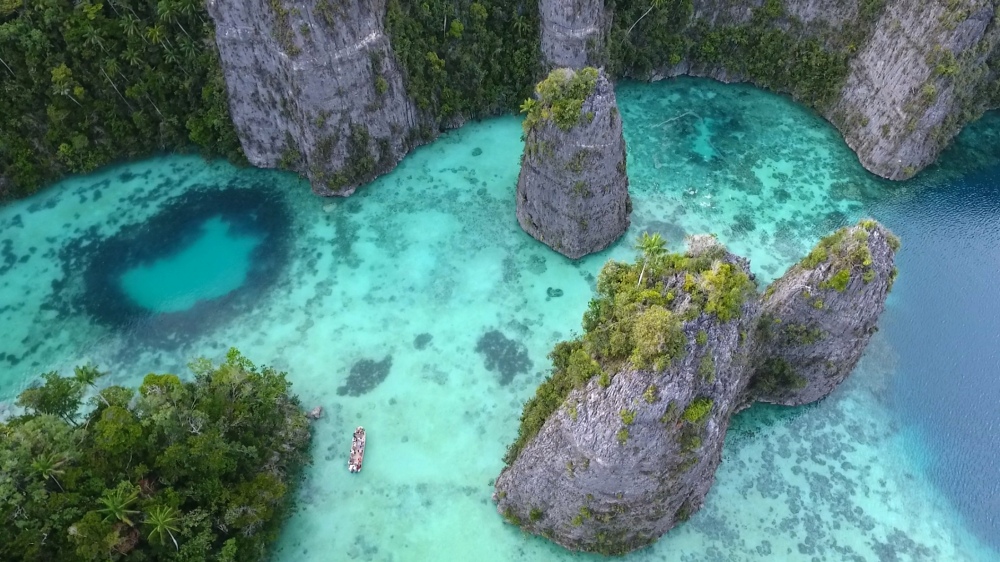
I got a little sidetracked there, but it does tie back into the story of the trip. I told Rod about the project to revisit the places my father had explored half a century ago and to document the changes, and understand the why. He put me in touch with Jos Pet, one of the owners of the Seven Seas liveaboard to explore possible synergies and using their ship as a platform to revisit the South East Asia locations. Jos was very kind to ask me to join this trip, which was leaving in only a few weeks and had one free bed.
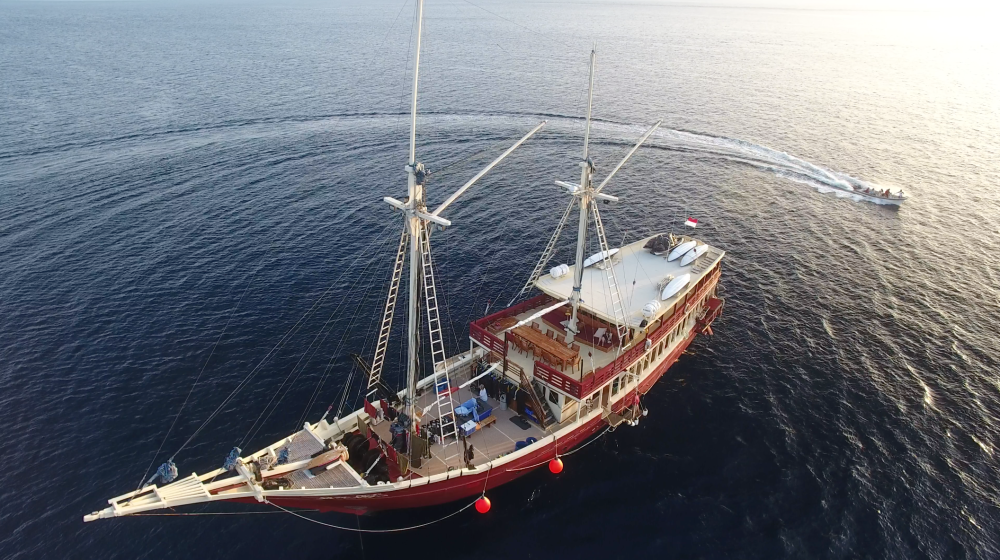
Exploring Raja Ampat on the Seven Seas vessel was an amazing adventure. Contemplating the complex landscapes of stone sculpted by time and the elements, bathing for hours in the heart of the coral triangle, dive after dive, the images of luxuriant coral and exuberant fish began to paint the inside of my eyelids, diluting desires, infiltrating dreams. In this heaven, where days blurred together, one creature would occasionally manifest its angelic grace: the oceanic manta ray.

Swiveling between the pillars of the divers’ bubbles, the manta rays come to a stationary hover to clean, casting upon our exhilarated faces and flailing bodies a magnanimous gaze. Later, I become lost in an endless field of corals, the dancing sunlight above raining undulating energy into the chloroplasts of the zooxanthella who feed them. Concentric clouds of fish pulsate around the corals to an imperceptible rhythm, dancing like a membrane between home and the hunt.
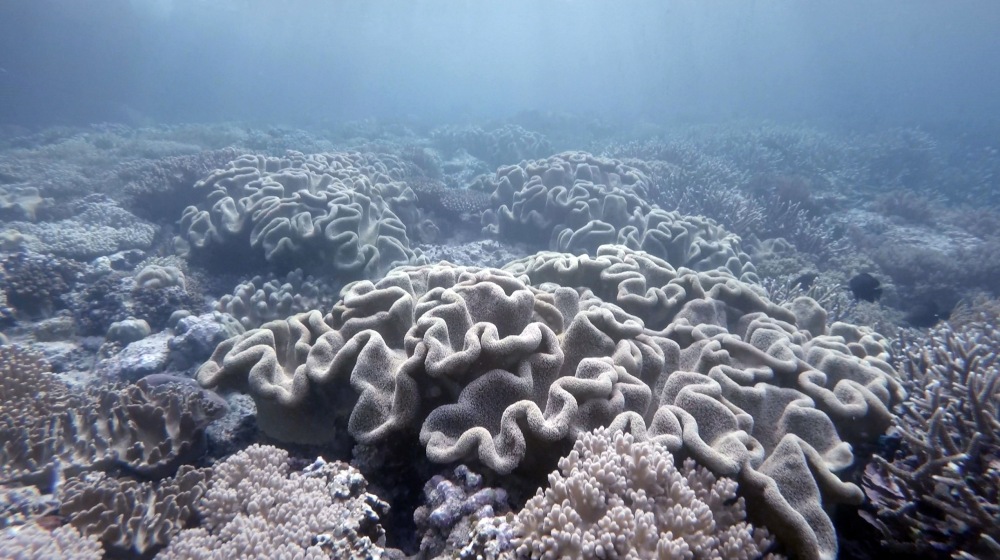
Above the water and between every dive, I launch the drone into the sky. Gaining new perspective, higher vantage, it feels like a widening of the mind as well as the field of view. My spirit is transferred to the small flying machine and its tiny camera. I fly at full speed only a few feet above the sea, then leap up to 400 feet to gain the overview.
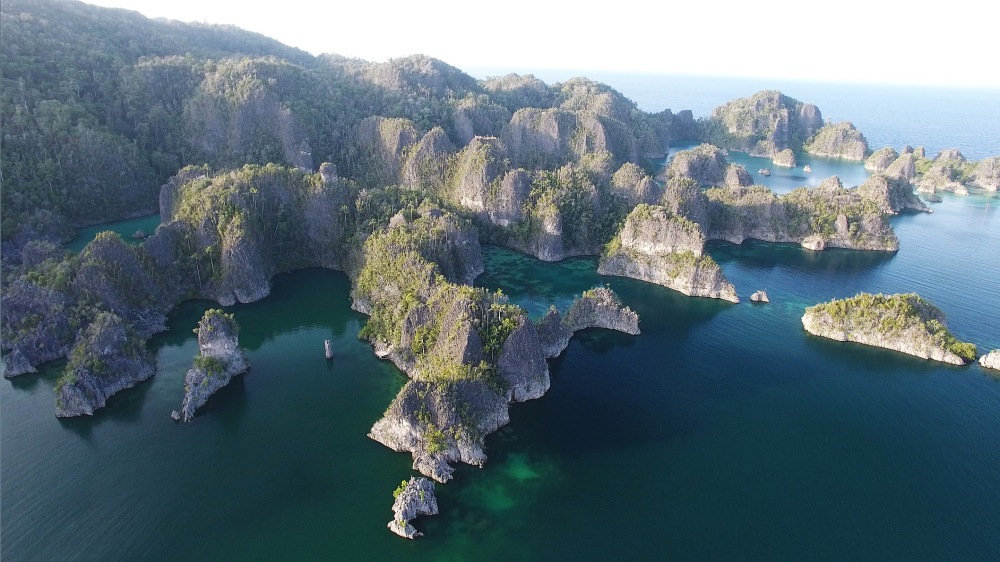
Scouting each island, I perhaps make the first observation ever of a hidden lake. None of the crew or the captain knew about it. It has probably been found by satellite long ago, but in case not, I baptized it Lake PY. After a quick flyby and identifying the best access route however, I was not permitted to climb the razor-sharp stone cliff that leads to it. Hopefully, this will be the object of a future expedition, and new discoveries!
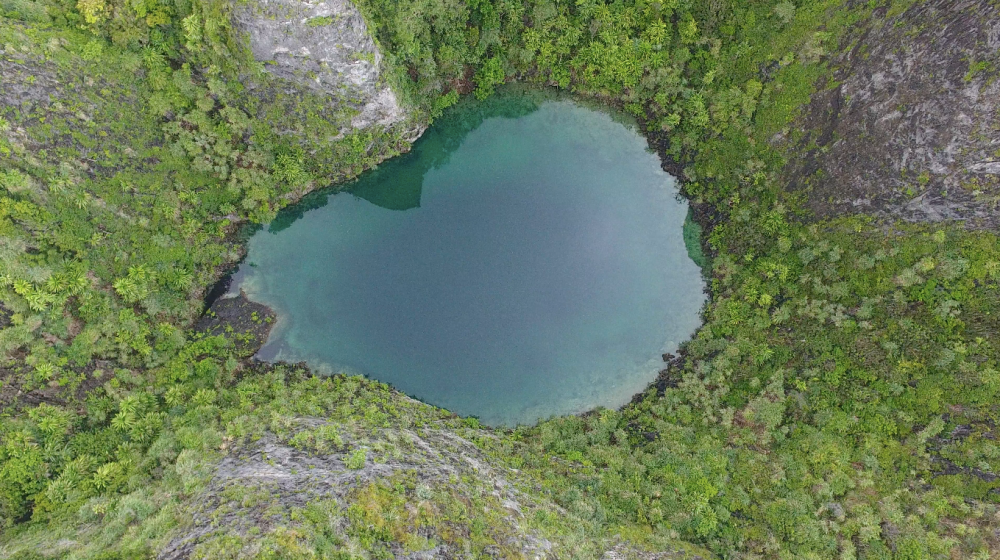
As we visit areas that have been declared no-take marine protected areas, we encounter fishermen, illegally casting nets and lines from their needle-like vessels. One man who converted from fishing to making coconut oil makes a small fortune selling us his goods. Overall, the coral was amazing. This heart of the coral triangle contains more biodiversity within a football field sized area than the entire Caribbean Sea.
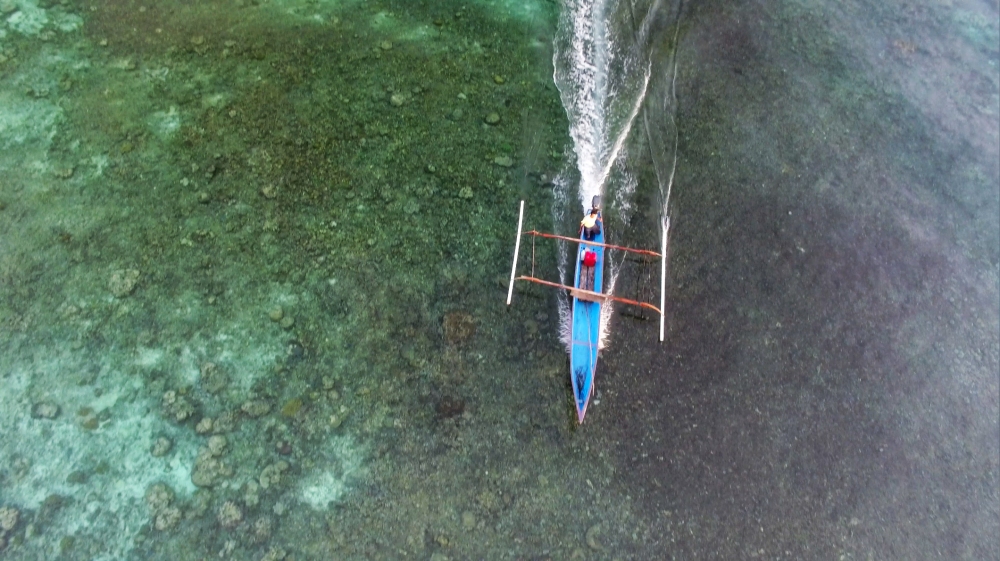
Only a few dive sites had an impressive amount of fish. Frail, scarce, and terrorized sharks could sometimes be seen in the dark depths. Plastic was very present everywhere, mostly floating at the surface. Together with the passengers and crew, we must have collected a dozen kilos of it from the sea during the trip. Because the ship served any fish at all, and because passengers would have it on a near-daily basis, I’ve had to wonder how much of that fish came from or impacted this MPA or another one. I tried to follow Ryan, my bunkmate, into going vegetarian, but rapidly tired of the tempe and tofu. Meat consumption contributes to roughly one third of global greenhouse gas emissions.

By choice or by fate, we are done eating the sea. Every year our taxes subsidize the 30+ billion dollars worldwide overfishing effort, making each one of us an active participant in the devastation of the ocean, regardless of our consumption choices. Fish plays such an important role for the food security of hundreds of millions of people worldwide. It should and could be better managed. Sustainably managing marine resources could trigger societal breakthrough of the magnitude of the invention of agriculture 12,000 years ago.

In Raja Ampat, one of the last remaining coral gardens of the planet, which has now been protected with no-take zones for 10 years, there is still ways to go to provide alternate livelihoods to local populations, and alternate meals and habits to visiting tourists. As fish stocks dwindle worldwide, this heart of the coral triangle needs improved surveillance and enforcement to protect its biological resources from local and international covetousness. Improved zoning and the creation of specific fishing corridors could ensure long-term subsistence fishing while conserving key sites.

Re-discovering the ship-littered harbor that’s Sorong after ten days at sea, Karen, one of the passengers, exclaimed: “wow. so much metal”. In this small harbor, handfuls of fortunate souls board wooden sailboats with eyes and minds wide open to absorb every instant. Those who disembark on the pier struggle to retain the precious images of untamed nature in their minds amidst the assaults of advertising announcements and screaming screens.

Special thanks to the Seven Seas team and Big Blue lights for sponsoring me on this trip.
[hr style=”single”]
For more blogs from Pierre-Yves Cousteau, visit cousteaudivers.wordpress.com.
Marine Life & Conservation
Paul Watson Released as Denmark Blocks Japan’s Extradition Bid

Renowned anti-whaling activist Paul Watson has been released from custody in Greenland after spending five months in detention. Denmark’s Justice Ministry rejected Japan’s request for his extradition, citing insufficient guarantees that his time already served in custody would be credited against any potential sentence.
The 74-year-old Canadian-American was arrested on July 21 in Nuuk, Greenland’s capital, when his ship docked to refuel. His arrest was based on a 2012 Japanese warrant related to a 2010 encounter in Antarctic waters. Japan alleged Watson obstructed operations and caused damage to a whaling research ship during efforts to disrupt illegal whaling. Watson has consistently denied these claims, maintaining his commitment to marine conservation.
Denmark, which oversees extradition matters for Greenland, concluded that while the legal conditions for extradition were met, the lack of assurances from Japan regarding time-served credit made extradition untenable.
In a video shared by his foundation, Watson expressed gratitude and relief, saying, “After five months, it’s good to be out… and good to know they’re not sending me to Japan.” He added that the most difficult part of his time in custody was being separated from his two young sons.
Watson is a pioneering figure in marine conservation, known for founding the Captain Paul Watson Foundation in 2022 after decades of activism with the Sea Shepherd Conservation Society. His bold efforts to defend marine life have earned him widespread support, including from celebrities and conservationists. His work has also been featured in the acclaimed reality TV series Whale Wars.
Watson’s lawyer, Jonas Christoffersen, praised the decision, stating, “We are happy and relieved that Paul Watson is now free.” He added that Watson is eager to reunite with his family and continue his vital work.
The arrest occurred while Watson’s vessel, the M/Y John Paul DeJoria, was en route to the North Pacific with a team of 26 volunteers to intercept a Japanese whaling ship. His foundation described the arrest as politically motivated and emphasized that Watson’s actions were focused on ending illegal whaling practices.
Japan resumed commercial whaling in 2019 after leaving the International Whaling Commission, asserting that whale meat is a cultural tradition. Conservationists, however, continue to challenge these practices, highlighting their impact on marine ecosystems.
Despite the challenges, Watson remains steadfast in his mission to protect marine life and bring attention to whaling practices. His dedication to ocean conservation has made him a globally respected advocate for the environment.
Marine Life & Conservation
12 Days of Zero-Waste Fish-mas

This holiday period, the Marine Conservation Society, the UK’s leading ocean membership charity, invites you to make some simple changes to eating fish this Christmas to help our seas.
Dr Kenneth Bodles, Head of Fisheries and Aquaculture at the Marine Conservation Society, said, “During the festive season, our consumption increases, but so does waste. Sustainability isn’t just about where food comes from – it’s also about how you use it. By reducing waste and making the most out of your seafood, you’re not only taking steps to be more ocean-friendly, but can also help to cut costs during what is often one of the most expensive times of the year”.
The Marine Conservation Society has compiled twelve tips on how to consume seafood sustainably with zero-waste this Christmas:
Buy whole fish instead of fillets
Instead of fillets, consider buying whole fish such as salmon, hake, or lemon sole. By adopting a “nose to tail” approach with cooking, whole-baked fish not only feeds a crowd, but also helps to minimise waste and maximise sustainability by using up every part of the animal, including bones, skin, and fat.
Make fish stock
Leftover fish bones or shells can be put to good use by boiling them to make a nourishing fish stock or bisque. This can be frozen and preserved for later use and makes for a flavourful base in a soup.
Make your own fish pâté
Avoid waste by turning leftover fish, such as smoked mackerel or salmon, into a delicious pâté by blending with cream cheese and lemon. Perfect when paired with crackers.
The sustainability of salmon and mackerel varies depending on where and how it is caught or farmed. For more information on green-rated options, check the charity’s Good Fish Guide.
Buy frozen
By purchasing seafood that is frozen or vacuum-packed, this helps to reduce waste by extending the shelf life of your food.
Fish pie
If you’re wondering what to do with leftover cooked fish, why not opt for a classic fish pie with mashed potatoes, leeks, and a cheesy sauce? A sure crowd pleaser on Boxing Day.
Use the head
Don’t forget the fish head! The meat is incredibly tender and flavourful. The charity recommends a cod’s head curry or recreating Fallow’s renowned cod’s head in siracha butter.
By stretching your ingredients further, not only is this a more sustainable way to enjoy seafood, but also cost-effective by repurposing leftovers and cooking creatively.
Boxing Day brunch
Mix leftover kippers or smoked salmon with scrambled eggs for a tasty, zero-waste, Boxing Day brunch.
For best choice, make sure you buy kippers, or herring, from the North Sea and the North Irish Sea.
Zero-waste storage
A top tip from the Marine Conservation Society to avoid waste is freezing fish offcuts to save for future use.
Crisp up the skin
Even leftover fish skin can be turned into a quick savoury snack by crisping it up in an air fryer with a little olive oil and salt.
Anchovies two ways
Leftover anchovies can either be blended with butter to make a delicious anchovy butter or tossed into pasta for a hit of umami flavour.
The charity recommends opting for anchovies caught in the Bay of Biscay for best choice.
Fishcakes
For an easy, zero-waste meal, leftover seafood trimmings can be mixed with mash and fried in breadcrumbs to make fishcakes.
Pickled mussels
Try pickling mussels in 1:1 vinegar and water, with a dash of sugar for a sustainable, zero-waste snack that can be enjoyed well beyond the festive season.
Mussels farmed in the UK are a seafood superhero. Grown using low-impact methods and harvested by hand, they get all the food they need from the sea around them. This makes them one of the most sustainable, ocean-friendly, and cost-effective seafood options.
Players of People’s Postcode Lottery have raised £6.6M towards the Marine Conservation Society’s vital work in making seafood more sustainable.
Laura Chow, Head of Charities at People’s Postcode Lottery, said: “Fish is a festive favourite for many, but making sustainable choices when it comes to how we buy and eat seafood makes all the difference for our ocean. Support from players of People’s Postcode Lottery has helped the Marine Conservation Society further its sustainable seafood work, so that we can all enjoy healthier, better protected seas.”
The Marine Conservation Society encourages you to make sustainable seafood choices a year-round habit, not just for Christmas. To check how sustainable the seafood on your plate is, you can visit the charity’s Good Fish Guide. The Guide helps consumers and businesses identify the most sustainable seafood using a simple traffic light system, based on where and how species are caught or farmed. Green is the best choice, amber means improvements are needed, and red indicates fish to avoid buying.
Zero-waste gift idea
Why not embrace a zero-waste Christmas by gifting a membership to support marine conservation? It’s a meaningful, low-waste gift that helps protect our ocean for generations to come. Memberships start from as little as £5 a month – the price of a sandwich and drink from your local coffee shop.
Find the latest sustainable seafood advice for wild-caught and farmed seafood on the Good Fish Guide, downloadable to your phone from www.mcsuk.org/goodfishguide.
-

 News2 months ago
News2 months agoIconic SS United States to become the World’s Largest Artificial Reef
-

 News3 months ago
News3 months agoBook Review – 52 Assignments: Underwater Photography
-

 Gear News3 months ago
Gear News3 months agoDYNAMICNORD – New German diving brand enters the British market
-

 News3 months ago
News3 months agoExploring Cenote El Pit: A Diver’s Dream
-

 Gear News3 months ago
Gear News3 months agoTry BARE drysuits (and maybe even win one!) this Friday with Sea & Sea at North West Dive Fest
-

 Marine Life & Conservation3 months ago
Marine Life & Conservation3 months agoBook Review: Coral Triangle Cameos
-

 Blogs2 months ago
Blogs2 months agoDive the Egyptian Red Sea this Autumn with Regaldive
-

 News3 months ago
News3 months ago2024 Ocean Art Underwater Photo Competition Announced


